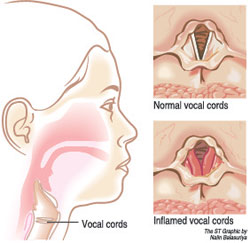To survive a flu, only to lose your voice might seem more than a little unfair, in addition to being quite inconvenient. Despite this it’s essential you give your throat a chance to rest says Dr. Saman Yasawardene, Consultant ENT Surgeon. More often than not, you should recover fully in three to four days, but should the hoarseness persist, it could be a sign of a more serious underlying cause. This week, Dr. Yasawardene speaks to MediScene about what can cause a hoarse voice and home remedies that could help you recover faster.
Understanding Laryngitis:
An inflammation in the mucous membrane lining the voice box or larynx is known as laryngitis. The voice box, located in the upper part of the respiratory tract, is essential to speech and such inflammations can result in a temporary inability to speak. Laryngitis is most often acute, lasting only a few days. However, some patients complain of chronic laryngitis that persists over a period of weeks or months. Chronic laryngitis may be caused by excessive alcohol consumption, smoking, or constant exposure to dust or chemical irritants like paint remover.
Laryngitis is often caused by some form of infection, which if neglected can progress to bronchitis or pneumonia, says Dr. Yasawardene. Aside from the hoarseness of the voice, fever, a running nose, sore throat, and swallowing difficulty may occur as well.
Postnasal drip, allergies, or inhalation of smoke fumes, or caustic chemicals can further irritate the larynx. If laryngitis is caused by a bacterial infection, antibiotics will be prescribed.
Rarely, laryngitis can be caused by infections such as tuberculosis or syphilis or a fungal infection.
In children, the larynx is already narrow, and an inflammation can further constrict the opening leading to breathing difficulties. It is essential they receive prompt treatment.
The sound of silence
A hoarse throat can make it difficult to communicate. Take the hint – your throat needs rest. Explaining that people who raise their voices for a living – politicians, singers and actors for instance – often find themselves nursing a sore throat, Dr. Yasawardene explains that it’s crucial that one not strain the voice further. The temptation to perform at an important concert despite a hoarse throat, for instance, might be one step too far and result in long term damage. Unsurprisingly, such cases of “voice abuse” are also common in young children, he adds. Be it at playtime or in school, children might resort to higher volume to get attention. The same is true of people who work in very loud environments, such as factories.
Though a hoarse throat is the primary symptom of laryngitis, it can be caused by other conditions as well. Fungal infections of the laryngitis are known to occur in asthmatic patients who rely on steroid inhalers. In other patients, nodules in that region can also cause hoarseness, says Dr. Yasawardene, explaining that these used to be known as ‘singers nodules’ after the people they were most commonly found in. “In these cases voice management matters a lot,” he says.
Yet another cause of hoarse voice is known as laryngopharyngeal reflux (LPR). Here, the acidic contents of your stomach may reflux all the way up the esophagus, into the back of the throat and even up to the back of the nasal airway. Patients often complain of a bitter taste and burning sensation. Some may also have difficulty breathing if the voice box is affected. LPR often presents with other symptoms such as breathing problems, cough, asthma, and can even result in life threatening situations. Prompt treatment of LPR, especially in children, is essential.
A condition known as vocal chord paralysis has also been linked to the occurrence of a hoarse voice. This happens when one or both of the vocal cords do not open or close properly, says Dr. Yasawardene. It can be caused by conditions as diverse as trauma, viral infections or even a tumour pressing against a nerve and is common in older people.
If your voice does not recover within a week or two, it is a good idea to visit a doctor. Your doctor will use a laryngeal mirror to rule out the presence of tumours or any other underlying cause. Smokers are especially at risk for cancer.
Five tips for a quicker recovery:
- Rest your voice, avoiding public speaking in particular. If you want to regain your voice, resting the vocal chords is your best option.
- Don’t smoke (and that includes passive smoking). Stay away from areas with poor air quality. If you're sensitive to air pollution, remove yourself from dusty or smoky areas.
- Keep yourself well hydrated. Keeping the vocal chords moist can ease hoarseness. Drink several glasses of water throughout the day. Avoid alcohol or caffeine. Make sure that what you drink is neither too hot nor too cold – both will strain the throat.
- If you have an allergy or cold that is causing you to cough or sneeze, ask your doctor for help. Your throat will heal faster if it isn’t further aggravated.
- If your voice doesn't return to normal within a couple of weeks, the problem may be bigger than a simple cold or allergic reaction. Ask your doctor for advice.
|


